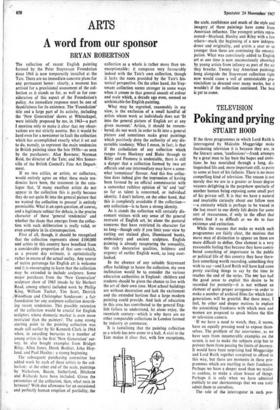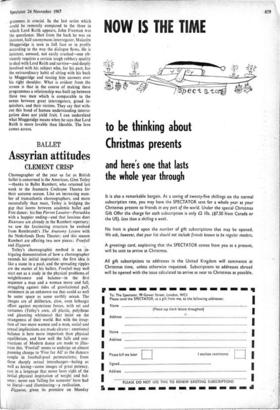Poking and prying
TELEVISION STUART HOOD
If the three programmes in which Lord Reith is interrogated by Malcolm Muggeridge make fascinating television it is because they are, in the literary sense, 'confessions'—frank attempts by a great man to lay bare the hopes and ambi- tions he has nourished through a long, dis- tinguished life and, more important still, to point to some at least of his failures. There is no more compelling kind of television. The reason is not merely that we are to a greater or lesser degree voyeurs delighting in the peepshow spectacle of another human being exposing some small part of his private self. It is that we have a natural and insatiable curiosity about our fellow men —a curiosity which is perhaps to be traced in the last resort to our dimly felt desire for some sort of reassurance, if only to the effect that others find it as difficult as we do to face existence and extinction.
While the reasons that make us watch such programmes are fairly clear, the motives that move men of distinction to appear on them are more difficult to define. One element is a very reasonable feeling that because they have contri- buted something of importance to the public or political life of this country they have there- fore something worth recording, something they wish to say—and Lord Reith will have had some pretty startling things to say by the time he reaches the end of the series. The BBC has had the good sense to exploit this desire to be recorded for posterity—it is not without an element of quite proper arrogance—in order to make a number of archival films for which later generations will be grateful. But there must, I feel, be other and deeper motives to explain the astonishing frankness with which men and women are prepared to speak before the film or television camera.
If we have a need to watch, they, it seems, have an equally pressing need to expose them- selves. The problem of the interviewer, as we have seen from innumerable examples on the screen, is not to make the subjects strip but to prevent them from passing the limits of decency. It would have been surprising had Muggeridge and Lord Reith together conspired to offend in this way, but there are moments in these pro- grammes which are startling in their frankness. Perhaps we have a deeper need than we realise to confess, to make a clean breast of things. Perhaps it is only when we have admitted publicly to our shortcomings that we can truly admit them to ourselves.
The role of the interrogator in such pro-
grammes is crucial. In the last series which could be remotely compared to the three in which Lord Reith appears, John Freeman was the questioner. Shot from the back he was an insistent, half-anonymous interrogator. Malcolm Muggeridge is seen in full face or in profile according to the way the dialogue flows. He is insistent, amused, not easily crushed—one ob- viously requires a certain tough rubbery quality to deal with Lord Reith and survive—and deeply involved with his subject who, for his part, has the extraordinary habit of sitting with his back to Muggeridge and tossing him answers over his right shoulder. What is evident from the screen is that in the course of making these programmes a relationship was built up between these two men which is comparable to the nexus between great interrogators, grand in- quisitors, and their victims. They say that with- out this bond of human understanding interro- gation does not yield fruit. I can understand what Muggeridge means when he says that Lord Reith is more lovable than likeable. The love comes across.















































 Previous page
Previous page